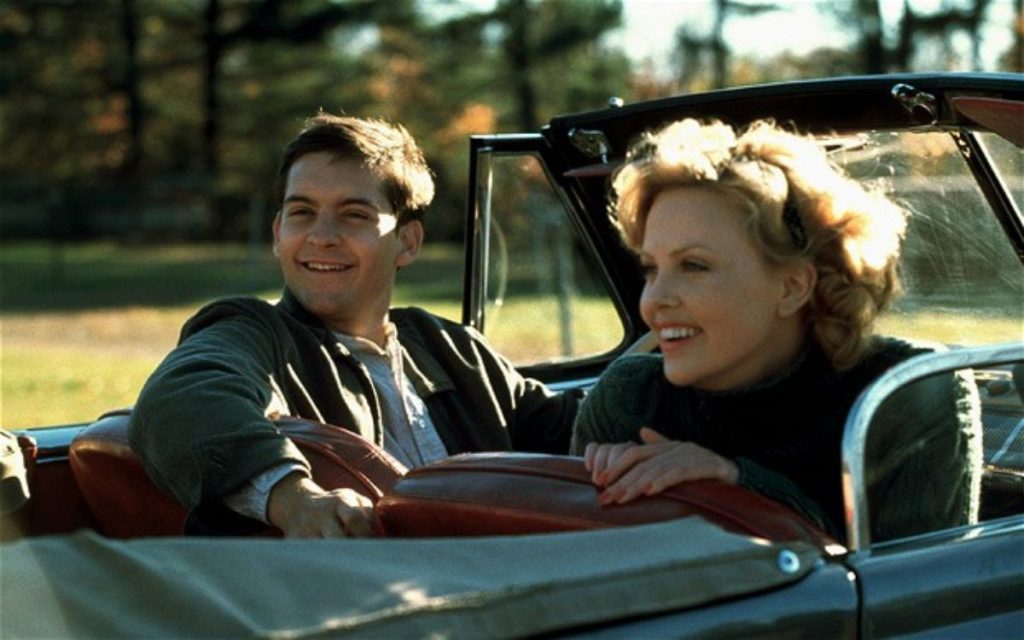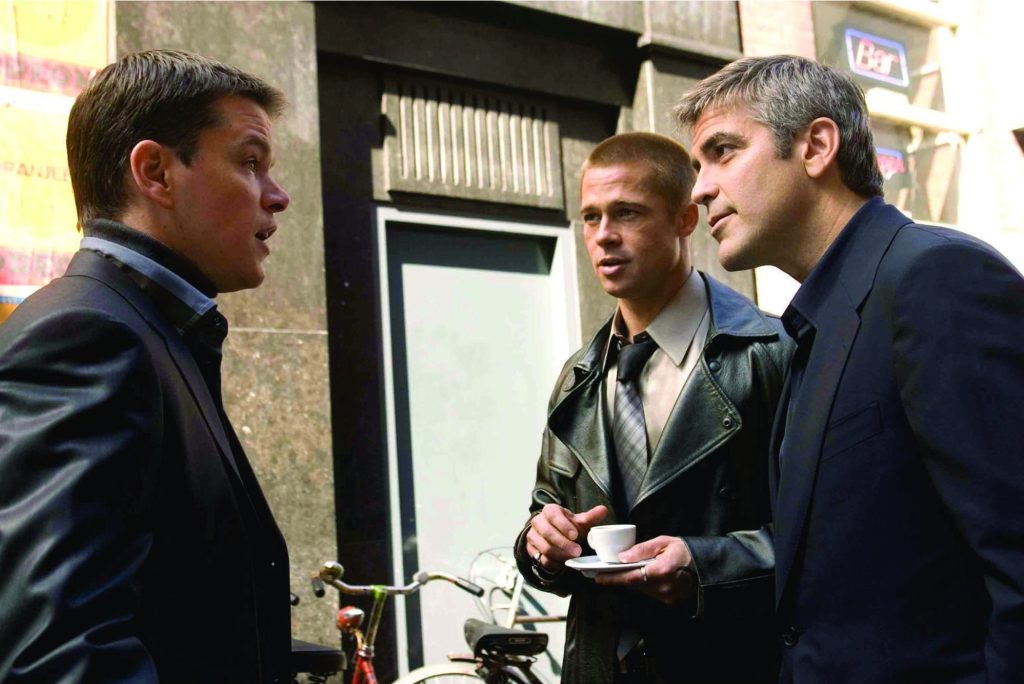Alec Baldwin does not like Harrison Ford. In his recently released memoir, Nevertheless, Baldwin isn’t content to merely insult the man, but deconstructs his entire image with the speed and ferocity of a prison-yard shanking. He describes Ford, Indiana Jones himself, as “a little man, short, scrawny, and wiry, whose soft voice sounds as if it’s coming from behind a door.” Baldwin attributes Ford’s action-hero stature to movie magic and wonders if Ford hasn’t been driven to alcoholism or insomnia over his crippling lack of an Oscar.
The potency of his venom comes as a surprise, considering the age of its source.
Twenty-five years ago, in the summer of 1992, Patriot Games hit theaters and made it official – Harrison Ford ran away with Alec Baldwin’s franchise and had no intentions of returning it.
The trouble began, as it so often does, with a near-sighted insurance salesman and a nuclear submarine.
A pair of Coke-bottle glasses sealed his fate – the closest Tom Clancy would ever get to military service was the ROTC. His consolation prize was selling insurance and writing obsessively researched military fiction on the side. It was just a hobby until Ronald Reagan off-handedly called his first novel “the perfect yarn.” The Hunt for Red October has sold over three million copies to date, the first of Tom Clancy’s 17 New York Times bestsellers. Film rights sold fast. The novel was a two-hander, with most of its 400 pages spent on a rogue Russian submarine captain, Ramius, and a try-hard CIA analyst, Jack Ryan, trying to convince everyone that the captain is defecting, not declaring World War III. Harrison Ford was approached to star as Ryan, but he felt the story belonged to Ramius. The producers wouldn’t let him play a Russian submarine captain, so he walked and the part of Jack Ryan was finally filled by an up-and-coming supporting actor, Alec Baldwin.
 The Hunt for Red October out-grossed 1990’s franchise heavy-hitters like Die Hard 2 and Back to the Future Part III. Critics also took to it, though Harrison Ford was right; more praise was reserved for Sean Connery’s commanding performance as Captain Ramius. Clancy himself gave it what passed for his stamp of approval, admitting the filmmakers “didn’t screw it up too much.” However unenthused, the author was content enough to sell the producers rights to two more Jack Ryan novels. Alec Baldwin was ready for a sequel, along with Die Hard and Red October director John McTiernan.
The Hunt for Red October out-grossed 1990’s franchise heavy-hitters like Die Hard 2 and Back to the Future Part III. Critics also took to it, though Harrison Ford was right; more praise was reserved for Sean Connery’s commanding performance as Captain Ramius. Clancy himself gave it what passed for his stamp of approval, admitting the filmmakers “didn’t screw it up too much.” However unenthused, the author was content enough to sell the producers rights to two more Jack Ryan novels. Alec Baldwin was ready for a sequel, along with Die Hard and Red October director John McTiernan.
What happened next will forever be a mess of conflicting accounts, bruised egos, and studio politics. In short, the producers wanted to make Patriot Games next. McTiernan and Baldwin, both Irish, didn’t especially want to make a movie about the Irish Republican Army. McTiernan left to work with Ford on something else. Baldwin stuck around until the studio pushed him to choose between Patriot Games and leading a revival of A Streetcar Named Desire on Broadway. Before he could decide, Ford left McTiernan’s project when the Patriot producers offered him Jack Ryan. McTiernan told Ford that Alec was still negotiating. According to McTiernan, Ford said “f*** him.” Baldwin was out.
While the decision seems mostly financial – Ford was a much bigger box-office draw than Baldwin – watching Patriot Games reveals it to be a shrewd artistic move as well.
If Baldwin’s Ryan is the geeky head of the history club, Ford’s Ryan is the consummate Boy Scout. Both are incorruptible to a fault, but running on different engines. Baldwin’s Ryan flew halfway around the world, fell out of a helicopter into the Atlantic, convinced an American submarine of a ghostly Russian counterpart, and traded shots with a saboteur between nuclear missiles, all to prove himself right. While he also ostensibly wanted to prevent nuclear war, his Ryan is driven by a hunch. A hunch that his superiors uniformly disagree with. Like the kid that knew his teacher graded his test wrong and wouldn’t let them get away with such injustice, his Ryan is just as interested in righteousness as he is in being right.
Ford’s Ryan, meanwhile, opens Patriot Games with a hushed phone call to a friend, enlisting them to replace his daughter’s dead goldfish while the family’s on vacation. He’s no longer the cocky second fiddle in the murky depths of an international incident; he’s a humble father, husband, and retired CIA analyst-turned-teacher.
Baldwin may be more interesting as Ryan in a supporting part, but Ford makes him worth watching in every scene.
Patriot Games picks up sometime later than Red October with the Ryans abroad in London. When they witness an IRA attack on a Royal motorcade, Jack gets his family to safety, then single-handedly thwarts the assassination attempt, killing a terrorist in the process. Unfortunately, he killed the brother of IRA extremist Sean Miller (a strong Sean Bean and a shaky accent), who now wants vengeance — family blood for family blood.
McTiernan’s The Hunt for Red October is as near-perfect a translation of the airport-paperweight potboiler as it gets. Scenes bounce from smoky boardrooms to windswept flight decks to cramped sub quarters and back again as characters spout military jargon and slowly notice the tension that’s been mounting all along. But Patriot Games is another animal. Director Philip Noyce, of the under-seen Dead Calm, takes over for a story with lower stakes. Patriot Games is a paranoid ‘70s political thriller poured into the Red Dragon/Manhunter mold.
Jack Ryan becomes the reluctant hero forced back into the line of duty when an equal-but-opposite patriot of a different creed targets his family. The climax even arrives in a dark house on a stormy night, with a deadly game of hide-and-seek played in grainy night-vision.
While it doesn’t have McTiernan’s Swiss-watch direction and the villains’ relentlessness strains credulity, the scene that makes Patriot Games is one of its quietest. After his 15 minutes of fame, when Ryan is back at work training the next generation of CIA operatives, a colleague (Samuel L. Jackson, underused) asks him why he sprang into reckless action in the first place.
“Rage,” Jack says. “Pure rage.” He even manages something like a laugh at his answer. “It just made me mad.”
It’s hard to imagine Baldwin’s Ryan getting inconsolably angry. But that’s one of Harrison Ford’s chief exports. Even in the deceptively calm scenes, like when Ryan watches a terrorist camp get decimated on his instinct and looks just shy of vomiting, you can feel that rage starting to simmer.
Patriot Games is a brisk, smart, and refreshingly low-key thriller. The film’s closing cliffhanger is such a simple, human question that it manages to be effective as much as it is alien in today’s blockbusters.
Tom Clancy hated it. Despite having championed him for Ryan in Red October, he loudly pronounced Ford too old in Patriot Games. Not one to play the punching bag, Ford told the press Clancy’s public criticisms hurt ticket sales and if he was so opposed to changes from the source material, “the simple expedient is not to sell your stuff.”
While it was a box-office success, Patriot Games fell short of its predecessor’s take, possibly because of its politics. Contemporary critics considered its handling of the IRA questionable at best and “morally repugnant” at worst.
Despite the polarizing reception, a sequel was fast-tracked for 1994. Tom Clancy would have even more problems with the follow-up, Clear and Present Danger, which McTiernan and Baldwin had wanted to make in lieu of Patriot Games. Clancy faxed the filmmakers everything from destructive criticisms to outright insults. He couldn’t understand why they’d change anything, considering Clear and Present Danger had been the best-selling novel of the 1980s. The filmmakers had the last laugh, though – Clear and Present Danger found a happier medium between the plotty Red October and personal Patriot Games and managed to outgross them both.
Preproduction for the next Ford-Ryan picture started immediately and just as immediately slowed. Attempts to bring The Cardinal of the Kremlin to the big screen, with William Shatner in talks for a role, fell apart within a year. In 1999, Harrison Ford off-handedly mentioned The Sum of All Fears would be the next Tom Clancy novel adapted. By 2000, Ford and Noyce left the project and the franchise over script problems.
Jack Ryan has returned to theaters twice in the years since, played by Ben Affleck in 2002’s The Sum of All Fears and Chris Pine in 2014’s Jack Ryan: Shadow Recruit, the first in the series not based on a Clancy novel. Yet whenever the internet turns out another absolutely definitive ranking of the Best Tom Clancy Movies, it’s between The Hunt for Red October and Clear and Present Danger for the title. Patriot Games is regarded as an uneven test run, for Noyce to take the wheel and Ford to catch up.
As Alec Baldwin’s memoir reminds, Patriot Games is remembered primarily for its stormy preproduction. Which is a shame, considering it’s a taut, confident, low-to-the-ground thriller the likes of which we don’t see anymore. Even if it does still end with an exploding speedboat.
Jeremy Herbert lives in clear and present Cleveland.



